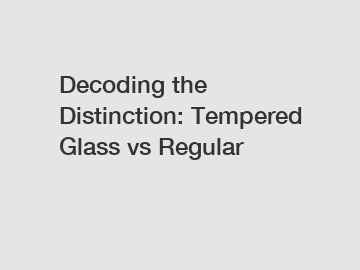Decoding the Distinction: Tempered Glass vs Regular
Decoding the Distinction: Tempered Glass vs Regular.
When it comes to choosing glass for various applications, one may come across terms like tempered glass and regular glass. While both types serve their purpose, they have distinct characteristics that set them apart. Understanding the differences between tempered and regular glass can help users make informed decisions based on their specific requirements. In this article, we will decode the distinction between tempered glass and regular glass, highlighting their features, uses, and benefits.
What is Tempered Glass?

Tempered glass is a type of safety glass that has undergone a special heat treatment process. The process involves heating the glass to high temperatures and then rapidly cooling it. This thermal treatment creates a state of high compression in the outer surfaces, making the glass up to four times stronger than regular glass. In addition to its increased strength, tempered glass is also more resistant to heat and thermal stress.
Uses and Benefits of Tempered Glass:
1. Safety: One of the primary uses of tempered glass is in applications where safety is a concern. It is commonly found in vehicle windows, shower doors, and glass walls in commercial buildings. In the event of breakage, tempered glass shatters into small, granular pieces, reducing the risk of injury from sharp edges and large shards.
2. Strength: Tempered glass is highly resistant to impact and can withstand heavy blows that would shatter regular glass. This makes it an ideal choice for locations prone to high winds, earthquakes, or areas where accidents may occur frequently.
3. Heat Resistance: Tempered glass has superior thermal resistance compared to regular glass. It can withstand higher temperatures without cracking or breaking, making it suitable for applications such as oven doors, fireplace screens, and stovetops.
What is Regular Glass?
Regular glass, also known as annealed glass, is the most traditional form of glass. It is produced by heating silica and other components to a molten state and then slowly cooling it to room temperature. This process allows the creation of a smooth, even surface but does not induce any additional strength or resistance.
Uses and Benefits of Regular Glass:
1. Versatility: Regular glass is widely used in various applications due to its versatility. It can be found in windows, mirrors, picture frames, and many other everyday objects. It provides a clear view and allows natural light to pass through effortlessly.
2. Cost-Effectiveness: Compared to tempered glass, regular glass is typically more affordable. It is commonly used in residential buildings where safety concerns are minimal, thereby making it a cost-effective option.
3. Easy to Work With: Regular glass is easier to cut, shape, and modify compared to tempered glass. This makes it a preferred choice for custom projects that require specific dimensions or complex designs.
Conclusion.
In conclusion, while tempered glass and regular glass may both be suitable for different applications, understanding their distinctions is crucial in making the right choice. Tempered glass offers enhanced strength, safety, and heat resistance, making it ideal for areas that require higher durability. On the other hand, regular glass is versatile, cost-effective, and easy to work with, making it suitable for everyday applications. By evaluating the specific requirements and weighing the advantages of each type, individuals can make the best decision for their needs.
If you have any further questions about tempered glass or regular glass, feel free to contact us. Our team of experts is ready to assist you with any queries or concerns you may have.
If you are looking for more details, kindly visit float glass flatness, float glass for household appliances, thickness of toughened glass.
200
0
0

Comments
All Comments (0)